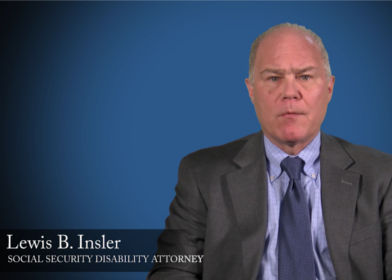Working While Receiving Social Security Benefits | New York
Lew Insler
Working While Applying for Social Security Disability Benefits
Hi. This is Lew Insler from Insler & Hermann, and today we’re going to talk about working while applying for, or receiving social security disability benefits. We feel our clients are better off financially and emotionally if they’re working. We never tell a client not to try to work, as long as their doctor approves, and a full answer as to whether or not you can work, depends on the specifics of your case. But generally, the following holds true. You can work at a level below what’s called Substantial Gainful Activity, and the amount for that changes each year, and still pursue your claim or continue to receive benefits. During the claims process, you can work up to three months in most cases, and six months under limited circumstances regardless of your earnings, and still use the original date of disability. That’s called an Unsuccessful Work Attempt, and it may actually help your claim.
Working After Winning Disability Claim
After you have been found disabled, you’re entitled to a Trial Work Period of up to nine months of an unlimited earnings, and those months don’t have to be consecutive. They can be within the first five years of your disability, after which any month in the next five years, where you make more than the Substantial Gainful Activity amount, you’re no longer entitled to benefits for that month. After those five years end, any month above Substantial Gainful Activity ends your entitlement to ongoing benefits. If you’re self-employed, it’s more complicated than just how much you were earning. Pensions, disability benefits, and other sources of wage replacement, do not affect your benefits. However, workers compensation might. The total of your social security disability and your workers compensation, can’t go over 80% of your past earnings.
By: Lew Insler
Working While Applying for Social Security Disability Benefits
Hi. This is Lew Insler from Insler & Hermann, and today we’re going to talk about working while applying for, or receiving social security disability benefits. We feel our clients are better off financially and emotionally if they’re working. We never tell a client not to try to work, as long as their doctor approves, and a full answer as to whether or not you can work, depends on the specifics of your case. But generally, the following holds true. You can work at a level below what’s called Substantial Gainful Activity, and the amount for that changes each year, and still pursue your claim or continue to receive benefits. During the claims process, you can work up to three months in most cases, and six months under limited circumstances regardless of your earnings, and still use the original date of disability. That’s called an Unsuccessful Work Attempt, and it may actually help your claim.
Working After Winning Disability Claim
After you have been found disabled, you’re entitled to a Trial Work Period of up to nine months of an unlimited earnings, and those months don’t have to be consecutive. They can be within the first five years of your disability, after which any month in the next five years, where you make more than the Substantial Gainful Activity amount, you’re no longer entitled to benefits for that month. After those five years end, any month above Substantial Gainful Activity ends your entitlement to ongoing benefits. If you’re self-employed, it’s more complicated than just how much you were earning. Pensions, disability benefits, and other sources of wage replacement, do not affect your benefits. However, workers compensation might. The total of your social security disability and your workers compensation, can’t go over 80% of your past earnings.
By: Lew Insler



